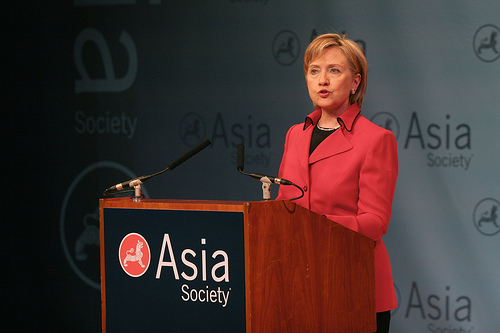The evolving framework will be tested. One such test may come from the renewed disputes over territory, sovereignty and posturing in the South China Sea. The US declaration that the South China Sea is a ‘national interest’ weeks after China called it a ‘core interest’ points to renewed chilling in their bilateral relationship.
I believe that the United States can and should take an active role in Asia. In the wake of the GFC both sides are adapting to new positions. This may mean that old methods of cooperation will become outmoded, and new balances must be found.
What is the position of America post-GFC?
I do not believe America is in absolute or terminal decline, but that it is in relative decline and that others are rising. The GFC has precipitated a movement away from the previous ‘unipolarity’ to a more multipolar world order.
My book calls on the US to respond to the GFC with the kind of resilience and inventiveness that has helped it respond to past crises.
A new context for American-Asian relations is emerging. America now faces a spectrum of strategic choice running from potential isolationism and the idea of American decline to the acceptance of a more multipolar world and a continued engagement on different terms.
Ambassador Koh agrees with me in some respects. He recognises the effort the Obama administration is making to engage Asia. I too credit the current administration for seeing the strategic imperatives and reaching out in a more multilateral way than in the past.
Where Ambassador Koh and I may disagree is in how we assess the ‘state of the patient’ right now. To me, if both Asia and the US don’t do something, the state of affairs will worsen. Economic and business opportunities and synergies will be missed. Asian stability and the US’ reputation will both be compromised. In contrast, Ambassador Koh might be taken to suggest that there is little wrong with the status quo.
America and Asia need to find new ways and a new vision for a shared future. As Ambassador Koh suggests, both sides will gain from engagement but I give more emphasis as to how the status quo is changing and to how new balances must be negotiated. In Asia Alone, I ask both sides to reexamine conventional wisdom.
The capacity and will of the United States to remain engaged in Asia should not be taken as a given. One can have the strongest intention to engage, as Obama indeed appears to have, but still be unable to deliver due to other factors. Take President Obama’s thrice-postponed trip to Indonesia. Each time, a pressing domestic issue trumped the President’s ability to be there, even though he has both sentimental and strategic reasons to visit Indonesia.
My intention is not to prescribe that Asians should welcome the thought of Asia being alone, divided from the United States. Nor do I wish to predict that the GFC will lead to such a division. Rather, I argue that Asia and the United States must begin a new stage of their partnership in which Asia is more united as a region, but still interdependent with a powerful and confident America. If this partnership model is followed, both will prosper.
Simon Tay is chairman of the Singapore Institute of International Affairs and author of Asia Alone: The Dangerous Post-Crisis Divide from America.

